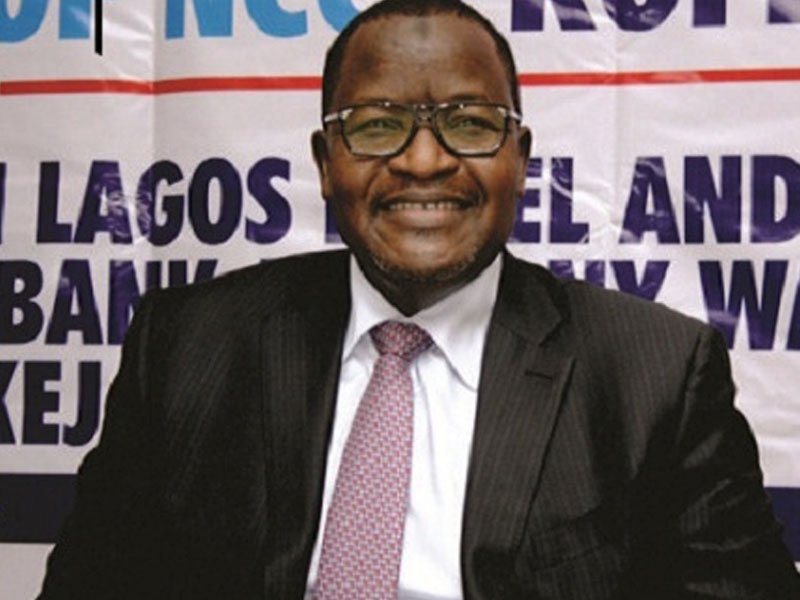The Nigerian Communications Commission has written the Attorney General of the Federation and Minister of Justice, Mr. Abubakar Malami, demanding the transfer of the initial N50bn paid by MTN Nigeria Communications to the regulator’s account with the Central Bank of Nigeria.
The Executive Vice Chairman, NCC, Prof. Umar Danbatta, disclosed this in Abuja on Monday while answering questions from journalists at a press conference to mark the one year anniversary of his coming on board.
The NCC boss, who said the money had been lodged in a recovery account opened by the OAGF with the CBN, added that it needed to be transferred to the NCC account before it could be moved to the Consolidated Revenue Account of the Federal Government.
The commission had imposed a fine of N1.04tn on MTN Nigeria Communications Limited in October 2015 for failing to disconnect 5.2 million improperly registered subscribers from its network. After initial negotiations, MTN went to court.
However, in a twist, it withdrew the case out of the court and paid N50bn through the OAGF to show the government that it was ready to embark on full negotiation in a bid to settle the matter out of court.
There appeared to be crack in the government’s handling of the matter when the Minister of Communications, Mr. Adebayo Shittu, denied that his ministry and its agencies took part in the negotiation and subsequent receipt of the money.
When the government and the NCC eventually entered into fresh negotiations with MTN, the fine was reduced to N330bn spread over a period of three years. The initial N50bn paid by the company was regarded as the first instalment.
Danbatta said MTN had since paid another N30bn, which means that the company has so far paid N80bn, with an outstanding balance of N250bn.
The NCC helmsman also said that the regulator declined a request by MTN to acquire the spectrum being used by Visafone even though it approved the acquisition of 100 per cent shareholding in the company by MTN.
The nation’s chief telecom regulatory officer argued that the acquisition of Visafone’s frequency could perpetuate MTN’s dominant position in the Nigerian telecommunications market, adding that the NCC would subject the request to a public inquest.
Danbatta also said that MTN would roll out services on the 2.6MHz spectrum acquired through a bidding process.
He said, “In the recent wireless broadband frequency bidding process for the 2.6MHz spectrum by the commission, MTN Nigeria Limited emerged the winner of six slots. The licensing of frequency in this slot has suffered several setbacks until recently when six slots out of 14 made available by the commission were allocated for immediate deployment of 4G-LTE services.
“By the rollout plans for this service as provided by the winner, broadband services on this frequency spectrum will be available in the last quarter of 2016.”
He added, “We have initiated processes for licensing of more broadband services on the 5.4GHz spectrum band. We have opened the process for the allocation of frequencies in the 70/80GHz band (e-band).
“Approval has been given for the deployment of 4G Long Term Evolution Technology by NATCOM Development and Investment Limited, which has launched the first Voice over LTE call on February 25.”
Danbatta also announced that the country’s broadband penetration had reached 20.95 per cent.
“Equally, on the percentage of Internet penetration, the country has reached a milestone of 47.44 per cent, second to South Africa on the continent,” he said.
On unsolicited text messages, Danbatta said the NCC had constituted a task force to verify the compliance of telecoms operators with the directives issued to them.
He said the regulatory agency would not shy away from sanctioning operators found wanting.

 Billionaire Watch3 weeks ago
Billionaire Watch3 weeks ago
 Startups4 weeks ago
Startups4 weeks ago
 News4 weeks ago
News4 weeks ago
 News4 weeks ago
News4 weeks ago
 Bitcoin4 weeks ago
Bitcoin4 weeks ago
 Naira4 weeks ago
Naira4 weeks ago
 Forex3 weeks ago
Forex3 weeks ago
 Treasury Bills4 weeks ago
Treasury Bills4 weeks ago

























